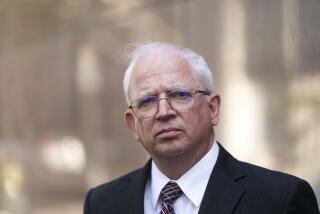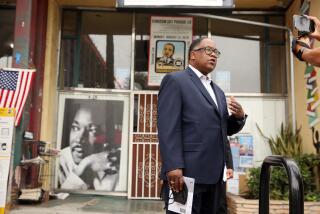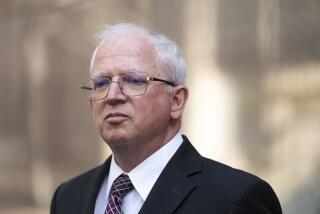Attorney Finds Himself Buried in Appeal Task
- Share via
For the last six months, no one--not even Roger Hedgecock himself--has been more engrossed in Hedgecock’s case than defense attorney Charles Sevilla.
While Hedgecock has embarked on a new career and the former mayor’s two trial attorneys have gone on to other cases, Sevilla has grappled with the formidable task of preparing Hedgecock’s appeal of his 13-count felony conviction on conspiracy and perjury charges stemming from illegal contributions to his 1983 mayoral campaign.
With more than 10,000 pages of trial testimony and a roomful of exhibits to wade through, Sevilla predicts, only half-jokingly, that Hedgecock’s appeal ultimately “will be measured by the poundage rather than pages.”
The attorney, who may seek a 30-day extension of the Nov. 4 deadline for filing the brief with the 4th District Court of Appeal, estimates that the appeal will be 200 pages.
“It’s like the cliche--if I had more time, I could have written it shorter,” Sevilla, 41, quipped.
Assuming that Sevilla meets his target of filing the appeal no later than December, the district attorney’s office will have until spring to respond to his brief, after which Sevilla will be given more time to file a counter-response.
Those timetables mean that the appeal court is not likely to rule on the case until at least next summer and, if the case is later appealed to the state Supreme Court, its resolution could be “a couple of years away,” Sevilla said. Hedgecock, who was sentenced by Todd to one year in jail, is free pending the outcome of his appeals.
A former public defender recognized as one of the city’s top appeals lawyers, Sevilla became involved in the case last fall when Hedgecock sought to overturn his conviction because of jury-tampering allegations.
Although Superior Court Judge William L. Todd Jr. ruled that those allegations did not affect the verdict, the charges will be a major component of Hedgecock’s appeal, Sevilla said. Those allegations include sworn declarations by two jurors that a court bailiff improperly discussed the case with the jury during deliberations.
Since receiving a transcript of the trial in the spring, Sevilla has spent about 300 hours on the appeal. During the last two months, the lawyer said, he has devoted about six hours daily to the case--reading and annotating about 300 pages of trial records daily, putting together a 150-page summary and beginning to write the brief itself.
“This is a great case, a wonderful case to handle as a lawyer,” Sevilla said. “It’s fascinating on multi-levels on legal points, and it’s one of those cases with a fascinating story behind it.”
Hedgecock was convicted last Oct. 9 of conspiring with former J. David & Co. principals J. David (Jerry) Dominelli and Nancy Hoover to funnel tens of thousands of dollars in illegal contributions to his 1983 campaign through a political consulting firm owned by Tom Shepard, a close friend of the former mayor. The perjury counts were based on charges that Hedgecock falsified financial disclosure statements to conceal that scheme.
Hedgecock’s appeal, however, will reiterate his overriding argument that the more than $360,000 that Dominelli and Hoover invested in Tom Shepard & Associates was a routine business investment and not, as prosecutors successfully argued, an illegal subsidy of Hedgecock’s campaign designed to circumvent the city’s $250-per-person contribution limit.
Other arguments to be raised in the defense appeal, Sevilla said, include contentions that Todd improperly quashed a subpoena seeking the judge’s own testimony on the jury-tampering allegations, that the judge and prosecutors misinterpreted state campaign reform laws, and that the verdict was tainted because one of the jurors purportedly was hung over while the jury voted.
Under plea-bargain agreements with the district attorney’s office, Dominelli, Hoover and Shepard each pleaded guilty to the conspiracy charges earlier this year. Hoover was fined $10,000, Shepard $1,000, and Dominelli was sentenced to a two-year prison term, to run concurrently with his 20-year federal sentence on tax evasion and fraud charges that resulted from the collapse of his La Jolla investment firm.
Describing those plea bargains as “relatively painless” ways for his three alleged co-conspirators to settle their cases, Hedgecock has said he does not believe that their guilty pleas will undermine his appeal.
In preparing the appeal, Sevilla receives periodic advice from Hedgecock’s two trial attorneys--local lawyer Michael Pancer, who handled Hedgecock’s first case, which ended in a hung jury February, 1985, and Las Vegas lawyer Oscar Goodman, who handled the retrial that concluded with Hedgecock’s conviction.
Pancer said the case has had little impact on his practice.
“I can’t trace any major clients to it, although I guess I probably got a couple of calls because of it, and there probably were a couple I didn’t get because of it,” Pancer said.
Meanwhile, Goodman, a nationally known lawyer whose clients have included some of the most notorious organized-crime figures in the country, currently is involved in another in his string of high-profile cases--defending jailed federal Judge Harry E. Claiborne in the first U.S. Senate impeachment trial in 50 years. Because federal judges are appointed for life, Claiborne, who is serving a two-year prison term on felony tax-evasion charges, could return to the bench after he completes his sentence unless he is convicted by the Senate.
Last month, Goodman made preliminary arguments before a special 12-senator panel and will argue the case before the full Senate this month.
“It was like appearing before the 12 brightest judges I’d ever been before,” Goodman said. “When it goes to the full Senate, that feeling will be magnified eight times.”
While obviously preoccupied with Claiborne’s case, Goodman said he is reminded of Hedgecock’s case “almost every day” by a photo of the former mayor that he keeps in his Nevada office.
“I think about that case a lot--one, because it’s still in the hopper to be won, and two, because I think an injustice occurred that eventually will be corrected,” Goodman said. “If there’s a new trial and the mayor calls, I’ll be there.”
More to Read
Go beyond the scoreboard
Get the latest on L.A.'s teams in the daily Sports Report newsletter.
You may occasionally receive promotional content from the Los Angeles Times.






